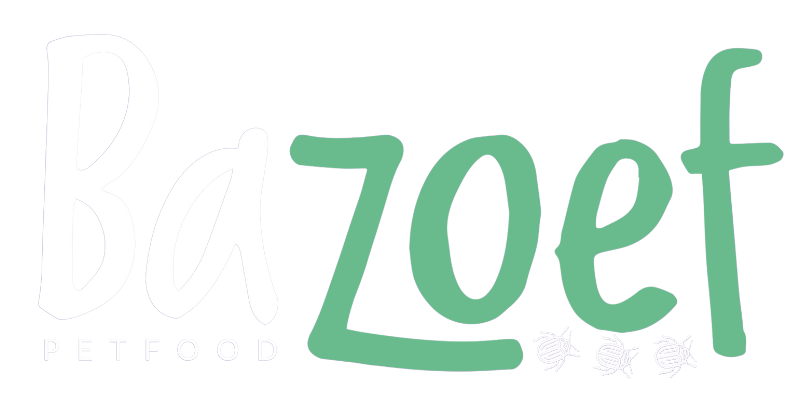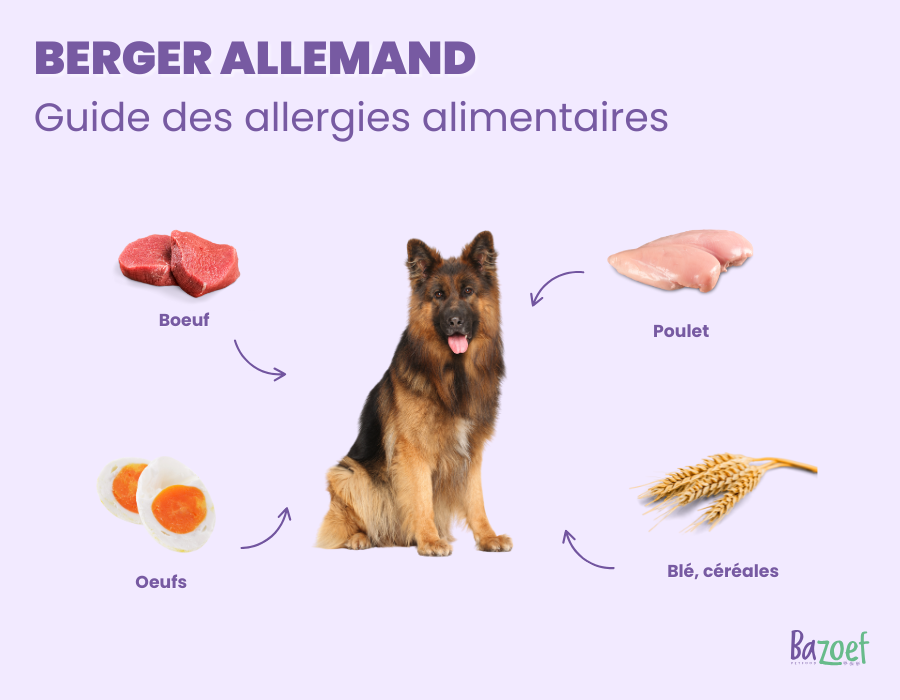The German Shepherd is a majestic, intelligent, and loyal dog, widely loved for its many qualities—whether as a family companion, working dog, or guardian.
However, despite their robust appearance, German Shepherds are prone to certain health issues, including food allergies, which can affect their comfort and overall well-being.
This comprehensive guide is here to help you understand and manage food allergies in German Shepherds.
Let’s dive in!

Food allergies in German Shepherds
Food allergies are a common cause of skin and digestive problems in German Shepherds.
This breed, known for its sometimes overreactive immune system and sensitive digestive tract, is particularly prone to developing adverse reactions to certain foods.
Food allergies occur when the dog’s body mistakenly identifies specific dietary proteins as threats, triggering an exaggerated immune response.
Unlike simple food intolerances—which only involve digestion issues without activating the immune system—an allergy engages the body’s defenses and leads to widespread inflammation.
Typical signs in German Shepherds include:
- Persistent itching, often around the paws, belly, and ears
- Recurrent ear infections (otitis), since their ears are a known weak spot
- Gastrointestinal troubles, such as chronic diarrhea, bloating, and foul-smelling gas
- Gradual loss of appetite or weight loss, caused by digestive discomfort or stress from constant itching
Important note: These allergies can develop suddenly, even if your dog has been eating the same brand of kibble or the same ingredients for years.
This is due to a process called gradual sensitization of the immune system.
To diagnose a food allergy, veterinarians typically recommend an elimination diet, removing all suspected protein sources for 8 to 12 weeks, then slowly reintroducing certain foods to pinpoint the exact trigger.
Table: Common culprits and hypoallergenic alternatives
| Frequently problematic food | Typical symptoms seen | Possible hypoallergenic alternatives |
| Chicken | Intense scratching, skin redness, loose stools | Insect protein, duck, white fish, lamb |
| Beef | Frequent ear infections, hair loss, excessive gas | Insect protein, duck, white fish, lamb |
| Wheat / gluten (grains) | Skin irritation, soft or mushy stools | Rice, sweet potato, peas |
| Dairy products | Vomiting, abdominal bloating | Lactose-free milk or complete removal |
| Eggs | Small red patches, generalized itching | Total avoidance or plant-based proteins |

What to do if your German Shepherd has a food allergy
1. See your veterinarian
The very first step is to consult your vet.
Only a professional can confirm whether it’s truly a food allergy and rule out other possible causes like parasites, skin infections, or hormonal issues, which can show similar symptoms.
2. Start an elimination diet
Your vet will likely recommend an elimination diet.
This involves feeding your German Shepherd a protein and carbohydrate source they’ve never eaten before, or a special food made with hydrolyzed proteins (proteins broken down into tiny pieces too small to trigger an immune reaction).
This diet needs to be followed strictly for 8 to 12 weeks, with no treats, table scraps, or chew bones that might contain other ingredients.
Sticking to this plan is essential to identify the culprit and give your dog’s system time to calm down.
3. Monitor symptoms closely
During this time, keep a close eye on your dog’s itching, ear infections, and digestive issues.
If these signs fade away, it strongly suggests a food allergy was the culprit.
To pinpoint the exact trigger, your vet may recommend reintroducing previous ingredients one by one. If symptoms quickly return, you’ll have identified the allergen.
4. Adjust your dog’s diet for the long term
Once the offending ingredient is found, it needs to be permanently eliminated from your German Shepherd’s diet.
Your vet can help you choose suitable commercial hypoallergenic kibble or guide you in preparing a balanced home-cooked diet. Some dogs will need to stay on this specialized nutrition for life to keep symptoms under control.
5. Maintain regular vet check-ups and adapt as needed
Ongoing check-ups are important to monitor your dog’s skin and digestive health.
If necessary, your vet might suggest supplements (like omega-3 for the skin or probiotics for gut health), specialized medicated shampoos, or adjustments to food portions as your dog ages or changes activity level.

Signs of food allergies in German Shepherds
Skin symptoms
Skin issues are the most common sign of food allergies in German Shepherds.
You’ll often see intense itching, typically focused on the ears, paws, belly, or around the muzzle.
There may also be redness, irritated patches, or scabs from constant scratching. In this breed, repeated or chronic ear infections are another classic clue often linked to a food reaction.
👉 At the first signs—persistent itching, recurring ear infections, or hairless spots—it’s best to see your vet promptly to prevent worsening and get an accurate diagnosis.

Digestive symptoms
Digestive issues are also quite common in German Shepherds, especially since this breed is known for having a somewhat sensitive stomach.
You might notice chronic diarrhea, bloating, or excessive gas. In some cases, dogs lose interest in food or gradually lose weight because they struggle to properly digest what they eat.
General symptoms
Beyond the skin and digestive signs, some German Shepherds may seem more lethargic, less playful, or, on the flip side, unusually restless due to the discomfort from constant itching.
They might also lick their paws excessively, a classic sign of ongoing discomfort. Bad breath and a dull, dry coat often go hand-in-hand with these problems.
Conclusion
Food allergies can quickly affect your German Shepherd’s quality of life—both physically and emotionally.
Persistent itching, painful ear infections, and digestive upsets cause real distress for your dog and understandable concern for you as their owner.
The good news? Once the culprit is identified, tailored dietary solutions are available.
Kibble made with alternative or hydrolyzed proteins usually stops these reactions, ensuring your German Shepherd gets a complete, balanced diet that’s gentle on their system—so they can regain their full energy and well-being.
This often shows up as recurring diarrhea, frequent foul-smelling gas, irregular stools, or occasional vomiting.
What about insect protein?
Among the alternative food options for dogs with allergies, insect protein stands out as an innovative and promising choice.
It offers several benefits for sensitive German Shepherds: it’s very unlikely to trigger allergies, highly digestible, and naturally packed with essential amino acids, vitamins, and minerals.
Beyond the health advantages, insect protein also comes with a major environmental plus.
Producing it requires far less water and land, and it generates a much smaller carbon footprint than traditional livestock farming—something that increasingly appeals to eco-conscious dog owners.
Other hypoallergenic alternatives
Alongside insect protein, there are several other dietary options that can help reduce the risk of reactions in German Shepherds:
- Alternative meats, like duck or lamb, which are less common in standard dog foods and therefore less likely to have already triggered sensitization.
- White fish, such as cod or trout, which are generally well tolerated and provide skin-friendly omega-3s.
- Hydrolyzed proteins, which are proteins broken down into tiny fragments so small that the immune system no longer recognizes them as allergens.
It’s important to remember that every dog is different. One German Shepherd might handle a certain protein just fine, while another might react poorly to it.
That’s why tailoring the diet—always under your vet’s guidance—is so essential to finding the right balance and keeping your furry friend healthy and comfortable!




